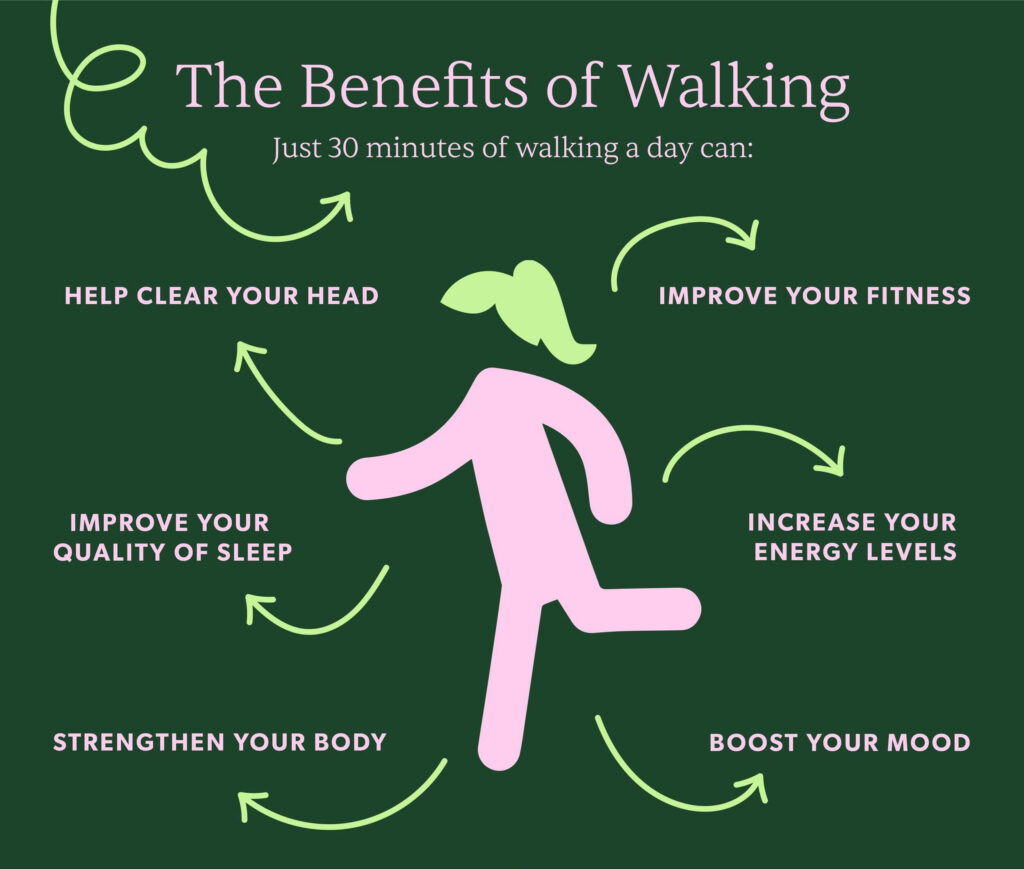Walking represents one of the most accessible and effective forms of physical activity available to people of all ages and fitness levels. Research consistently demonstrates that incorporating just 30 minutes of walking into your daily routine can transform your health in remarkable ways. Let’s explore the comprehensive benefits of walking that make this simple activity a powerful tool for wellness.

Cardiovascular Health Benefits of Walking
1. Supports Heart Health Regular walking strengthens your cardiovascular system by improving circulation and helping maintain healthy blood pressure levels. Studies suggest that consistent walking habits may contribute to better overall heart function and reduced cardiovascular risk factors.
2. Assists with Weight Management Walking increases caloric expenditure and can boost metabolic rate, making it an excellent complement to a balanced diet for those looking to maintain or achieve a healthy weight. This low-impact exercise supports sustainable lifestyle changes.
3. Promotes Healthy Blood Pressure Research indicates that regular brisk walking may help support healthy blood pressure levels. This gentle form of exercise can be particularly beneficial as part of a comprehensive approach to cardiovascular wellness.
Mental Health and Cognitive Benefits of Walking
4. Reduces Stress and Tension One of the most immediate benefits of walking is its ability to help manage daily stress. Physical activity naturally supports the body’s stress response system and can promote feelings of relaxation and well-being.
5. Enhances Energy Levels Counter-intuitively, walking when you feel tired can actually boost energy levels. This happens because physical activity improves circulation and oxygen delivery throughout the body, leaving you feeling more alert and refreshed.
6. Supports Brain Function Walking increases blood flow to the brain, which may support cognitive functions including memory, concentration, and mental clarity. Regular walkers often report improved focus and mental sharpness.
7. May Help with Mood Balance Physical activity like walking can positively influence mood and emotional well-being. Many people find that regular walks help them feel more balanced and optimistic throughout the day.
Physical Health Benefits of Walking
8. Improves Circulation Walking stimulates blood flow throughout the body, helping deliver oxygen and nutrients to muscles and organs more efficiently. This improved circulation supports overall physical health and vitality.
9. Supports Respiratory Health Regular walking can help strengthen the muscles involved in breathing and may contribute to improved lung capacity and respiratory efficiency over time.
10. Provides Natural Vitamin D Outdoor walking offers the added benefit of natural sunlight exposure, which helps your body produce vitamin D. This essential nutrient supports bone health, immune function, and mood regulation.
Disease Prevention Benefits of Walking
11. May Support Cancer Prevention Some research suggests that regular physical activity, including walking, may be associated with reduced risk factors for certain types of cancer, though individual results can vary significantly.
12. Helps Manage Blood Sugar Walking can be beneficial for blood sugar management and may help improve insulin sensitivity, making it a valuable activity for those concerned about metabolic health.
13. Supports Bone and Muscle Health As a weight-bearing exercise, walking helps maintain bone density and strengthens key muscle groups, particularly in the lower body and core.
Quality of Life Benefits of Walking
14. Improves Sleep Patterns Many people find that regular walking helps establish better sleep routines. The combination of physical activity and natural light exposure can support healthy sleep-wake cycles.
15. Enhances Balance and Coordination Walking regularly helps maintain and improve balance, coordination, and stability, which becomes increasingly important as we age.
16. Boosts Immune System Function Moderate exercise like walking may support immune system function by promoting healthy circulation and helping the body maintain its natural defense mechanisms.
17. Increases Overall Life Satisfaction Regular walkers often report higher levels of life satisfaction and well-being. The combination of physical activity, time outdoors, and personal achievement contributes to an improved quality of life.
18. Builds Sustainable Healthy Habits Perhaps one of the greatest benefits of walking is its sustainability. Unlike more intensive forms of exercise, walking can be maintained throughout life and easily adapted to changing circumstances and fitness levels.
Getting Started with Your Walking Routine
The beauty of walking lies in its simplicity and accessibility. You don’t need expensive equipment, gym memberships, or special training to begin experiencing the benefits of walking. Whether you prefer peaceful morning strolls through your neighborhood, energizing lunch-break walks, or evening walks in local parks, every step contributes to your overall wellness journey.

Start gradually if you’re new to regular exercise, and consider consulting with healthcare providers about the best approach for your individual situation. Remember that consistency matters more than intensity when it comes to reaping the long-term benefits of walking.
The evidence is clear: incorporating 30 minutes of walking into your daily routine can be one of the most beneficial decisions you make for your health and well-being. From supporting cardiovascular health to enhancing mood and energy levels, the benefits of walking extend far beyond simple physical fitness.
Take that first step today – your future self will thank you for it.
Disclaimer: This content is for informational and educational purposes only. It is not intended to provide medical advice or replace consultation with qualified healthcare professionals. Always seek the advice of your physician or other qualified health providers with any questions you may have regarding a medical condition.






